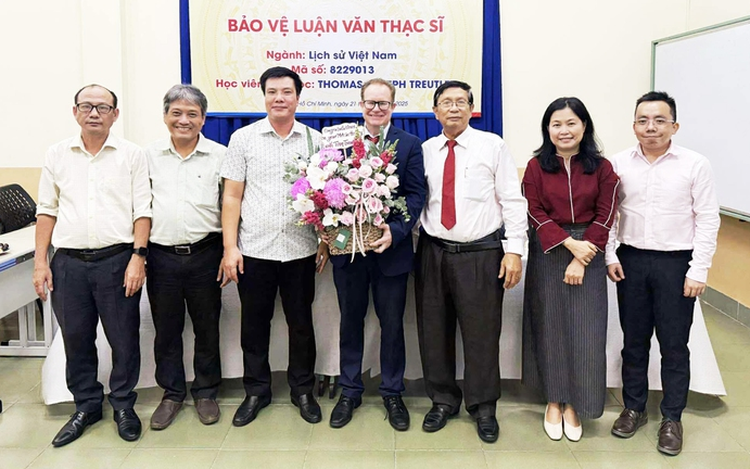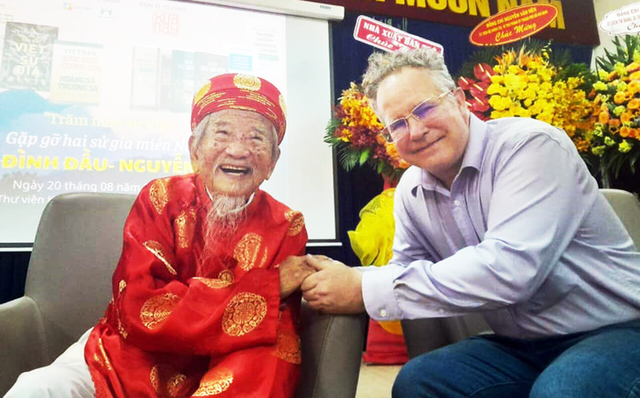
Lawyer Thomas Treutler (C) during his master’s thesis defense at the University of Social Sciences and Humanities under the Vietnam National University-Ho Chi Minh City. Photo: Supplied
“Vietnamese history has many unique aspects and stories that are little known but offer profound lessons on independence and resilience and I want to share that with the world,” Treutler said suring an interview with Tuoi Tre (Youth) newspaper, explaining his lifelong commitment to Vietnamese history.
For him, studying the country’s past is more than an academic pursuit; it is a heartfelt way to express love and gratitude for a land he considers his second home.
Piecing information together for thesis
Treutler's thesis, titled 'A study on 200 Vietnamese Exiled by the French to Gabon in 1888 and 1894,' explores a relatively obscure chapter of colonial history.
While much attention is given to Vietnamese communities in Europe, the U.S., and Southeast Asia, little is known about those forcibly sent to Africa during the colonial era.
Treutler wanted to shed light on these forgotten individuals.
Among the 200 exiles, more than 10 had participated in the anti-French Go Cong uprising.
After its failure, they were captured and deported. Most of the exiles struggled to adapt to the harsh climate, soil, and living conditions in Gabon, and many eventually died there.
Because the subject had not been widely researched, Treutler had to piece together fragmented information from multiple sources in Vietnam and abroad.
He spent a significant amount of time at libraries and archives across Vietnam and tapped into American repositories that preserve documents from the French colonial period.
He also drew from French sources, particularly newspapers from the late 19th century, which vividly recorded events and figures of the time.
To ensure a comprehensive understanding, Treutler consulted Vietnamese historians and scholars.
“Comparing various perspectives helped me not only gather data but also better grasp how Vietnamese scholars interpret and present history,” he said.
Master's journey
Treutler’s academic plan was delayed due to the COVID-19 pandemic, but his passion kept him going.
His connection to Vietnamese history began during his undergraduate years.
Though he originally trained in engineering and law, he completed additional undergraduate history courses at the University of Social Sciences and Humanities to qualify for the master’s program.
“It was an interesting experience to study alongside much younger students,” he recalled.
While the coursework itself was not overly difficult, each subject revealed new dimensions of Vietnamese history, offering both broader and deeper perspectives.
“I clearly felt I was being equipped with the academic foundation to understand and analyze history in a scientific way,” he said.

Lawyer Thomas Treutler (R) at a meeting with Vietnamese historian Nguyen Dinh Tu. Photo: Supplied
The most time-consuming and challenging part, however, was researching and writing the final thesis.
He spent at least six months gathering and processing materials before beginning the writing process.
It was a period of both difficulty and growth, where he learned not only historical knowledge but also the perseverance required for academic research.
Treutler’s fascination with Vietnamese history began nearly 30 years ago when he first arrived in the country.
He was drawn to its culture and historical depth, reading every issue of Kien Thuc Ngay Nay (Today's Knowledge) and Tuoi Tre Cuoi Tuan (Weekend Tuoi Tre) magazines, which he kept as personal historical archives.
While working as an engineer in Silicon Valley, he became connected to the Vietnamese community and began learning the language at Stanford University.
Classical Vietnamese works such as 'Viet Nam Van Hoa Su Cuong' by Dao Duy Anh and 'Van Hoc Viet Nam Su Yeu' by Duong Quang Ham were his gateway to Vietnamese history.
Reading these challenging texts in Vietnamese deepened his respect for the language and the country’s past.
To Treutler, learning history is not merely an exploration of the past, but a profound way to understand a society, its people, and the values it preserves.
He believes Vietnam’s history contains many untold stories of resilience and adaptability that deserve global recognition, at least within academic circles.
He is expected to graduate at the end of this year or early next year.
Upon returning to Vietnam to receive his degree, he plans to visit the places mentioned in his thesis.
Though he knows these places have changed over more than a century, he hopes to physically connect with the spaces once inhabited by the exiled Vietnamese.
“I want to see if any traces or memories of those ancestors remain,” he said.
Currently planning for retirement, Treutler intends to leave his legal career behind and fully dedicate his time to researching Vietnamese history.
He is particularly interested in overlooked stories and lesser-known historical figures—those not typically highlighted in textbooks but essential to the rich tapestry of Vietnam’s past.
Preserving Vietnamese traditions at home
Treutler’s wife is Vietnamese, and their household strives to maintain Vietnamese cultural traditions in daily life.
This includes strong family ties, honoring ancestors, and gathering for traditional meals and celebrations, even while living in the U.S..
He believes that patriotism does not need to be loudly expressed; it is often reflected in quiet, everyday gestures.
His son, Henry, currently a university student majoring in piano, loves to play Vietnamese pieces. Through music, Treutler sees a natural connection between his son and Vietnam.
Henry also enjoys painting, and many of his artworks depict familiar Vietnamese images—ao dai (traditional Vietnamese long gown), rice fields, temples, and pagodas.
“It’s through these simple things that a love for Vietnam is quietly and deeply passed on,” Treutler said.


Max: 1500 characters
There are no comments yet. Be the first to comment.